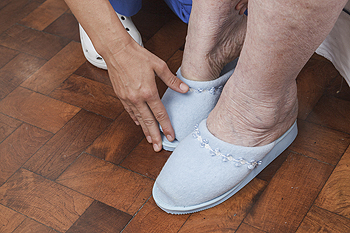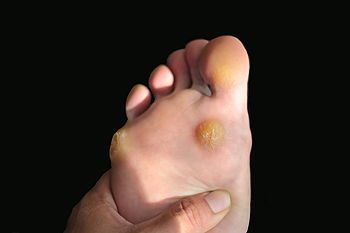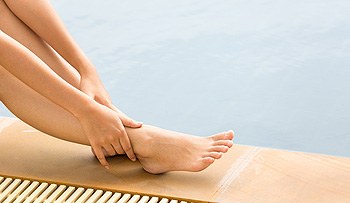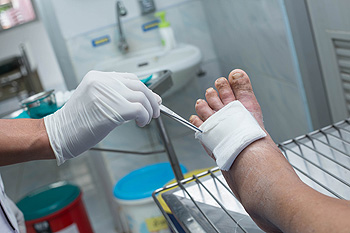Houston
Pearland
 Foot pain is common among the elderly population. It can gradually occur for a variety of reasons which can include medical conditions such as diabetes, arthritis, or complications with circulation. Research has indicated the importance for older people to check the conditions of their feet on a daily basis, as this may be helpful in avoiding unpleasant foot ailments. One of the methods that can be practiced in maintaining good foot health includes checking the bottom of the feet for cuts, bruises, or wounds. Additionally, it is beneficial to check what type of shoes are worn, and to ensure there is adequate room for the toes to move freely in. If you would like additional information on what to look for in elderly patient's feet, please consult with a podiatrist.
Foot pain is common among the elderly population. It can gradually occur for a variety of reasons which can include medical conditions such as diabetes, arthritis, or complications with circulation. Research has indicated the importance for older people to check the conditions of their feet on a daily basis, as this may be helpful in avoiding unpleasant foot ailments. One of the methods that can be practiced in maintaining good foot health includes checking the bottom of the feet for cuts, bruises, or wounds. Additionally, it is beneficial to check what type of shoes are worn, and to ensure there is adequate room for the toes to move freely in. If you would like additional information on what to look for in elderly patient's feet, please consult with a podiatrist.
Proper foot care is something many older adults forget to consider. If you have any concerns about your feet and ankles, contact Dr. Linda D. Nachmani from Central Foot & Ankle Associates. Our doctor can provide the care you need to keep you pain-free and on your feet.
The Elderly and Their Feet
As we age we start to notice many changes in our body, but the elder population may not notice them right away. Medical conditions may prevent the elderly to take notice of their foot health right away. Poor vision is a lead contributor to not taking action for the elderly.
Common Conditions
Susceptible Infections
Diabetes and poor circulation can cause general loss of sensitivity over the years, turning a simple cut into a serious issue.
If you have any questions please feel free to contact one of our offices located in Houston, and Pearland, TX. We offer the newest diagnostic and treatment technologies for all your foot and ankle needs.
Read more about Elderly and their Feet People who have experienced a corn on their feet are often aware of the pain and discomfort they can cause. Corns can develop between the toes, which are referred to as soft corns. The pain may be severe while walking in shoes, and mild relief may be found when it is covered by a corn pad. Corns are often caused by wearing shoes that do not fit correctly, and the corn may diminish when proper footwear is worn. Corns that develop on top of the toes are known as hard corns, and can form as a result of friction that comes from the top of the foot rubbing against the top of the shoe. Corns can cause pain that can affect the structure of the feet, which is why it is suggested that you consult with a podiatrist who can properly remove any corns you may have, and guide you toward proper prevention.
People who have experienced a corn on their feet are often aware of the pain and discomfort they can cause. Corns can develop between the toes, which are referred to as soft corns. The pain may be severe while walking in shoes, and mild relief may be found when it is covered by a corn pad. Corns are often caused by wearing shoes that do not fit correctly, and the corn may diminish when proper footwear is worn. Corns that develop on top of the toes are known as hard corns, and can form as a result of friction that comes from the top of the foot rubbing against the top of the shoe. Corns can cause pain that can affect the structure of the feet, which is why it is suggested that you consult with a podiatrist who can properly remove any corns you may have, and guide you toward proper prevention.
Corns can make walking very painful and should be treated immediately. If you have questions regarding your feet and ankles, contact Dr. Linda D. Nachmani of Central Foot & Ankle Associates. Our doctor will treat your foot and ankle needs.
Corns: What Are They? And How Do You Get Rid of Them?
Corns are thickened areas on the skin that can become painful. They are caused by excessive pressure and friction on the skin. Corns press into the deeper layers of the skin and are usually round in shape.
Ways to Prevent Corns
There are many ways to get rid of painful corns such as:
Treating Corns
Although most corns slowly disappear when the friction or pressure stops, this isn’t always the case. Consult with your podiatrist to determine the best treatment option for your case of corns.
If you have any questions please feel free to contact one of our offices located in Houston, and Pearland, TX. We offer the newest diagnostic and treatment technologies for all your foot and ankle needs.
Read more about Understanding Corns and Calluses Research has indicated the importance of maintaining everyday foot care. One of the first steps in accomplishing this is by wearing shoes that fit correctly. This may help to prevent uncomfortable foot conditions from developing, including bunions, hammertoes, or ingrown toenails. Additionally, it is beneficial to regularly trim the toenails, and the feet may feel better when they are washed daily. Many patients enjoy using a moisturizer on their feet, which may be helpful in preventing cracked heels. There are several ways to pamper your feet for general well-being, and it is suggested that you consult with a podiatrist who can guide you toward choosing methods that are right for you.
Research has indicated the importance of maintaining everyday foot care. One of the first steps in accomplishing this is by wearing shoes that fit correctly. This may help to prevent uncomfortable foot conditions from developing, including bunions, hammertoes, or ingrown toenails. Additionally, it is beneficial to regularly trim the toenails, and the feet may feel better when they are washed daily. Many patients enjoy using a moisturizer on their feet, which may be helpful in preventing cracked heels. There are several ways to pamper your feet for general well-being, and it is suggested that you consult with a podiatrist who can guide you toward choosing methods that are right for you.
Everyday foot care is very important to prevent infection and other foot ailments. If you need your feet checked, contact Dr. Linda D. Nachmani from Central Foot & Ankle Associates. Our doctor can provide the care you need to keep you pain-free and on your feet.
Everyday Foot Care
Often, people take care of their bodies, face and hair more so than they do for their feet. But the feet are a very important aspect of our bodies, and one that we should pay more attention to. Without our feet, we would not be able to perform most daily tasks.
It is best to check your feet regularly to make sure there are no new bruises or cuts that you may not have noticed before. For dry feet, moisturizer can easily be a remedy and can be applied as often as necessary to the affected areas. Wearing shoes that fit well can also help you maintain good foot health, as well as making it easier to walk and do daily activities without the stress or pain of ill-fitting shoes, high heels, or even flip flops. Wearing clean socks with closed shoes is important to ensure that sweat and bacteria do not accumulate within the shoe. Clean socks help to prevent Athlete’s foot, fungi problems, bad odors, and can absorb sweat.
If you have any questions please feel free to contact one of our offices located in Houston, and Pearland, TX. We offer the newest diagnostic and treatment technologies for all your foot and ankle needs.
Read more about Everyday Foot Care Diabetic patients tend to have a higher chance of developing foot conditions, most commonly, foot ulcers. A foot ulcer can be defined as an open sore that heals slowly. This condition typically affects a patient’s big toe, or the ball of the foot. Diabetic patients are more at risk for developing a foot ulcer for a variety of reasons, including nerve damage. Because nerve damage can cause a loss of feeling in the feet, diabetic patients may not always be aware if they have injured their feet or have developed a wound. If wounds are left untreated for too long, it is likely for an infection to develop, causing more severe foot damage. To help prevent wounds on the feet from causing serious harm, it’s suggested that if you are a diabetic patient, you check your feet on a daily basis for any abnormalities. For more information on wound care, please speak with a podiatrist for professional care.
Diabetic patients tend to have a higher chance of developing foot conditions, most commonly, foot ulcers. A foot ulcer can be defined as an open sore that heals slowly. This condition typically affects a patient’s big toe, or the ball of the foot. Diabetic patients are more at risk for developing a foot ulcer for a variety of reasons, including nerve damage. Because nerve damage can cause a loss of feeling in the feet, diabetic patients may not always be aware if they have injured their feet or have developed a wound. If wounds are left untreated for too long, it is likely for an infection to develop, causing more severe foot damage. To help prevent wounds on the feet from causing serious harm, it’s suggested that if you are a diabetic patient, you check your feet on a daily basis for any abnormalities. For more information on wound care, please speak with a podiatrist for professional care.
Wound care is an important part in dealing with diabetes. If you have diabetes and a foot wound or would like more information about wound care for diabetics, consult with Dr. Linda D. Nachmani from Central Foot & Ankle Associates. Our doctor will assess your condition and provide you with quality foot and ankle treatment.
What Is Wound Care?
Wound care is the practice of taking proper care of a wound. This can range from the smallest to the largest of wounds. While everyone can benefit from proper wound care, it is much more important for diabetics. Diabetics often suffer from poor blood circulation which causes wounds to heal much slower than they would in a non-diabetic.
What Is the Importance of Wound Care?
While it may not seem apparent with small ulcers on the foot, for diabetics, any size ulcer can become infected. Diabetics often also suffer from neuropathy, or nerve loss. This means they might not even feel when they have an ulcer on their foot. If the wound becomes severely infected, amputation may be necessary. Therefore, it is of the upmost importance to properly care for any and all foot wounds.
How to Care for Wounds
The best way to care for foot wounds is to prevent them. For diabetics, this means daily inspections of the feet for any signs of abnormalities or ulcers. It is also recommended to see a podiatrist several times a year for a foot inspection. If you do have an ulcer, run the wound under water to clear dirt from the wound; then apply antibiotic ointment to the wound and cover with a bandage. Bandages should be changed daily and keeping pressure off the wound is smart. It is advised to see a podiatrist, who can keep an eye on it.
If you have any questions, please feel free to contact one of our offices located in Houston, and Pearland, TX. We offer the newest diagnostic and treatment technologies for all your foot care needs.
Read more about Wound Care